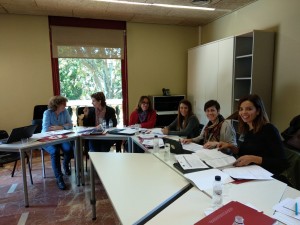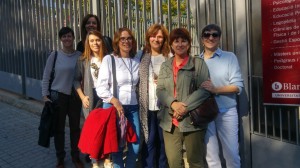Written by Yara de Benito
On the 25th October the colleagues from the ReALL group from the University of Huelva travelled to Ramón Llull University, Blanquerna, to work on the development of a new European project. Together with the colleagues of the CILCEAL research group, a work group was created for the elaboration of the CEFR MEDIATION STRATEGIES: TOWARDS A SOCIO-EMOTIONALLY ENHANCED PLURILINGUAL LANGUAGE EDUCATION” project frame approved by the Council of Europe for its execution during the 2018/2019 course and leaded by the main Researchers of these groups: PhD. M.Carmen Fonseca (ReALL, University of Huelva) and PhD. María González Davies (CILCEAL, University Ramón LLull). At the same time, 15 representatives from educative institutions of diverse levels from 6 different countries of the European Union are participating in this project.
In 1981, Vygotsky was already speaking about mediation as a central axis in communication. Lantolf and Thorne (2006) identified mediation as “the process through which humans deploy culturally constructed artifacts, concepts, and activities to regulate the material world or their own and each other’s social and mental activity”. In the Common European Framework of Reference for Languages and Companion Volume (2018), Mediation has its place as a new form of weighing the interaction that is produced in communicative situations and problem solving. That is why, the decision to carry out the present Project was taken in view of the need of calibration of Mediation descriptors. It is based on the belief that making teachers and students aware of the relevant role of mediation and training them in mediation strategies, could help to develop education through social and emotional interaction. The main goal is to analyse mediation skills through problem solving tasks that enhance a plurilingual and socio-emotional language education.
Therefore, the first Kick-off meeting carried out in Barcelona was completely satisfactory, fulfilling the objective of defining the guidelines related to the content, stages, calendar and available resources for the execution of the project about the aspects of mediation and its implication in learning, teaching and evaluating. This way, the researchers from both groups carried out an intense working day which leaded to the first decisions and the guidelines design which will generate the launching of this project.

Further reading:
Common European Framework of Reference for Languages: Learning, Teaching, Assessment. Companion Volume with new descriptors. Council of Europe, 2018.
Lantolf, J., &Thorne, S. (2006). Sociocultural Theory and the Genesis of Second Language Development. Oxford: Oxford University Press.
North, B., & Piccardo, E. (2017). Mediation and exploiting one’s plurilingual repertoire: exploring classroom potential with proposed new CEFR descriptors. Learning and Assessment: Making the Connections, 87.
Piccardo, E. (2012). Médiation et apprentissage des langues: pourquoi est-il temps de réfléchir à cette notion? Ela. Études de linguistique appliquée, (3), 285-297.
Vygotsky, L. (1981). The genesis of higher mental functions. In J. Wertsch (Ed.), The Concept of Actiuty in Soviet Psychology. Armonk, N.Y.: M.E. Sharpe.

